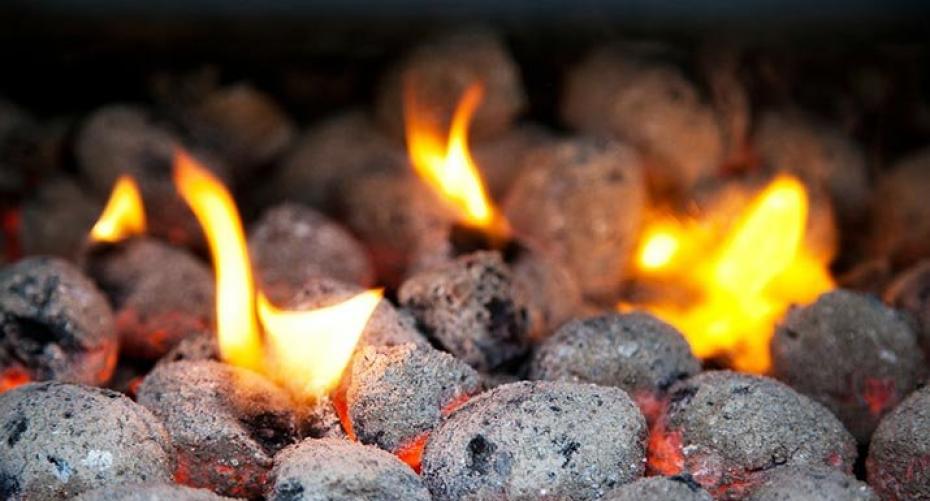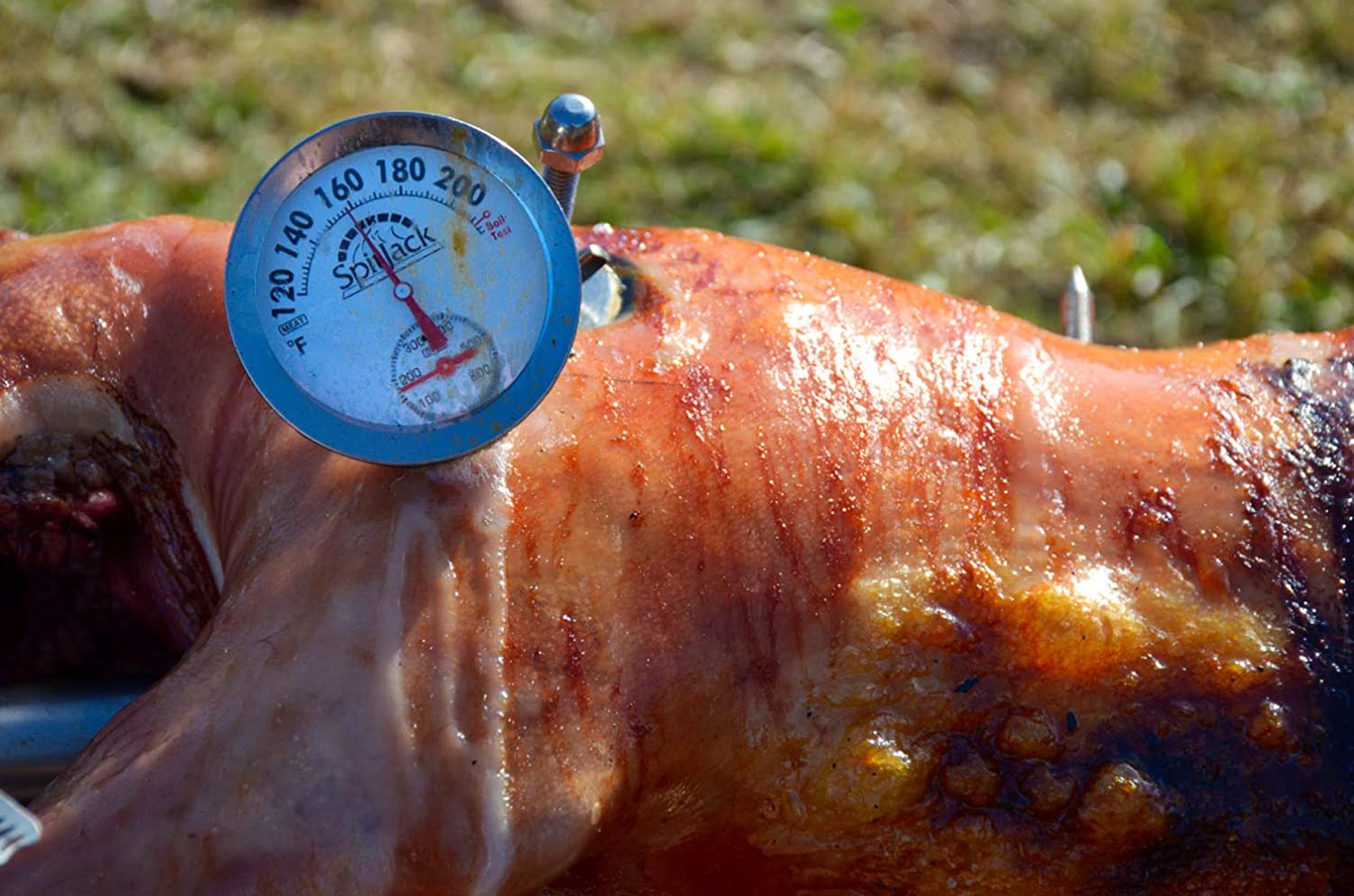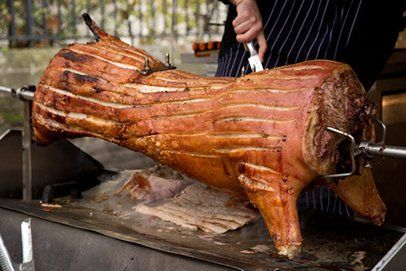Rotisserie Cooking
READY TO SCHEDULE YOUR ORDER?.. Please note, that when placing an order for any of our PIG or SIDES options, a 25% non-refundable deposit is required to book your order. We thank you for your interest in Martin's Roast A Pig!
5 EASY STEPS
5 EASY STEPS
BEFORE YOU BEGIN - Items You Will Need:
- Proper Amount of Charcoal
- Small Shovel
- Lighter Fluid
- Non Combustible Grease Container
- Extension Cord
- Hot Pads
- Cutting Tables
- Serving Trays
- Thermometer
- 9/16" or Adjustable Wrench
- Garbage Cans
- Optional - Marinate, Rubs or adding small pieces of Fruit Wood with the Charcoal when grilling (this will enhance the flavor).
Step 1
ALWAYS light the charcoal before placing the pig in the cooker. Start with 20lbs of Charcoal, 10lbs per
tray, soak with a quart of Lighter Fluid for 10 minutes before lighting, let the Charcoal burn for
approximately 30 minutes. Set the Pig in the Cooker belly side down and close the Cooker Door. Attach the
motor and set at slowest speed.
tray, soak with a quart of Lighter Fluid for 10 minutes before lighting, let the Charcoal burn for
approximately 30 minutes. Set the Pig in the Cooker belly side down and close the Cooker Door. Attach the
motor and set at slowest speed.
Step 2
Try to maintain the Cooker at 250F to 300F - Every 1 1/2 hour shake off the Charcoal Ashes by opening
up the Cooker Door using the provided Short Handled Hook, add approximately 5lbs of Charcoal using a
short handled shovel.
up the Cooker Door using the provided Short Handled Hook, add approximately 5lbs of Charcoal using a
short handled shovel.
Step 3
Once you get close to the recommended Cooking Time, check the Temperature when adding Charcoal,
using a probe Thermometer, probe the thickest part of the Pig Shoulder, you'll get the best quality at 180*,
but anything above 165* is safe for consumption. Once the Pig is almost done shut off the motor, then
rotate the pig 1/4 turn every 15 minutes.
using a probe Thermometer, probe the thickest part of the Pig Shoulder, you'll get the best quality at 180*,
but anything above 165* is safe for consumption. Once the Pig is almost done shut off the motor, then
rotate the pig 1/4 turn every 15 minutes.
Step 4
Use two people to lift the Pig & Spit from the Cooker and place it on a Table. Pull the pins and loosen the
set screws on the End Plates, remove the long pins and then slide out the Center Rod.
set screws on the End Plates, remove the long pins and then slide out the Center Rod.
Step 5
When removing the meat, we recommend using Yellow Dishwashing Gloves. Peel back the Skin and start
pulling the meat off the bones. Alternating from shoulder to the ham, will mix the different sections of
meat, which will result in the signature taste of Roasting A Pig. Discard the white membrane connected
to the bottom of the ribs, plus other greasier sections. Using a Scissors; cut the meat to the desired length
and place in trays or warming ovens, apply sauce if desired. We love Our Homemade Sauce and use
approximately 1 gallon per 70 pounds.
pulling the meat off the bones. Alternating from shoulder to the ham, will mix the different sections of
meat, which will result in the signature taste of Roasting A Pig. Discard the white membrane connected
to the bottom of the ribs, plus other greasier sections. Using a Scissors; cut the meat to the desired length
and place in trays or warming ovens, apply sauce if desired. We love Our Homemade Sauce and use
approximately 1 gallon per 70 pounds.
WARNING: Only Use Charcoal Lighter Fluid, Any Other Combustible Material May Present Extreme Danger. It
is not uncommon for grease to ignite if the temperature rises too high, if this does occur do not raise the lid. Instead,
close all the vents, to reduce the temperature and extinguish the flames. If the grease draining from the cooker ignites, extinguish with Baking Soda. DO NOT USE WATER.
WARNING: Only Use Charcoal Lighter Fluid, Any Other Combustible Material May Present Extreme Danger. It
is not uncommon for grease to ignite if the temperature rises too high, if this does occur do not raise the lid. Instead,
close all the vents, to reduce the temperature and extinguish the flames. If the grease draining from the cooker ignites, extinguish with Baking Soda. DO NOT USE WATER.
NOTICE: When returning the Rotisserie Cooker, DO NOT PLACE THE MOTOR IN THE COOKER
NOTICE: When returning the Rotisserie Cooker, DO NOT PLACE THE MOTOR IN THE COOKER





